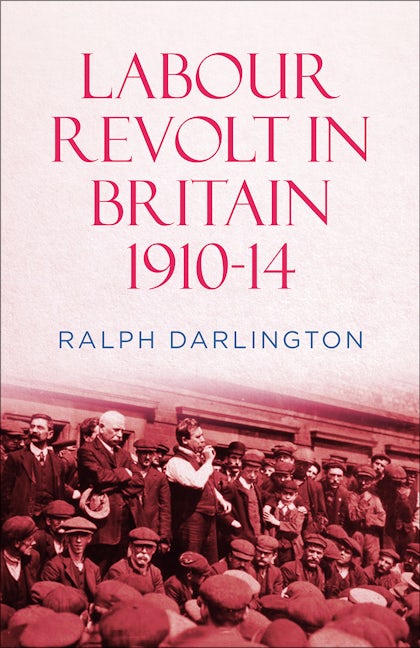
Labour Revolt in Britain 1910-14
New insights into one of the most important episodes in British labour history
'Fascinating' - Raquel Varela, labour historian
The Labour Revolt that swept Britain in the early 20th century was one of the most sustained, dramatic and violent explosions of industrial militancy and social conflict the country has ever experienced.
It involved large-scale strikes by miners, seamen, dockers, railway workers and many others, and was dominated by unskilled and semi-skilled workers, many acting independently of trade-union officials. Amidst this powerful grassroots energy, the country saw widespread solidarity action, phenomenal union membership growth, breakthroughs in both industrial unionism and women's union organisation, and a dramatic increase in the collective power of the working-class movement. It heralded political radicalisation that celebrated direct action and challenged head-on the Liberal government and police and military, as well as parliamentary reformism of the Labour Party.
Exploring the role of the radical left and the relationship between industrial struggles and political organisation, with new archival research and fresh insights and combining history from below and above, Ralph Darlington provides a multi-dimensional portrayal of the context, causes, actors, dynamics and contemporary significance of the Labour Revolt.
Ralph Darlington is Emeritus Professor of Employment Relations at Salford University. He has published a number of books, including Glorious Summer: Class Struggle in Britain 1972 and Radical Unionism: The Rise and Fall of Revolutionary Syndicalism. His research has been featured in national newspapers, and radio and television.
'Fascinating ... reminds us, with passion and vigor, of the years of political and trade union organisation of the English workers' movement on the eve of the Great War. Unmissable’
- Raquel Varela, labour historian, professor at FCSH-Universidade Nova de Lisboa and author of ‘A People's History of Europe: From World War 1 to Today’'A timely warning from history. Rising poverty and strike action. Collective bargaining, a tool for managing workers discontent. Westminster failing workers. An active rank & file holding unions accountable. All vital lessons we must apply during this current period of unrest'
- Henry Fowler and Robert Poole, Co-Founders, Strike Map'Based on meticulous historical research, this important study refutes once again the myth of working-class 'quiescence'. Addressing the remarkable eruption and trajectory of the great Labour Revolt in the years before World War I, Ralph Darlington reconstructs the many forms of autonomous worker resistance and its entanglement with trade union officialdom, as well as close links to radical socialist politics ... Provides a highly significant new contribution to the analysis of the limits and potential of industrial militancy and its relationship to political action and organisation'
- Marcel van der Linden, International Institute of Social History, Amsterdam'In the first book-length study of the 1910–14 labour revolt, Ralph Darlington convincingly conveys the breadth, depth, and limitations of its many strike movements. Within ten years, British politics, trade unionism, and industrial relations would be transformed'
- Dave Lyddon, Keele University, founding editor of 'Historical Studies in Industrial Relations''Drawing on modern historical research, Darlington depicts a broad working-class revolt in which radical activists played an important catalysing role. In discussing both the successes and the failures of the movement, he demonstrates its continued contemporary relevance'
- Richard Hyman, Emeritus Professor of Industrial Relations, Founding Editor, 'European Journal of Industrial Relations', Fellow of the British Academy‘Details a great moment in British and Irish working-class history, one where fundamental change seemed possible.’
- ‘Counterfire’‘Incisive, erudite’
- ‘Times Literary Supplement’Acknowledgements
Abbreviations
Introduction
Part I BACKCLOTH
1. Contexts and Causes
2. Influence of the Left
Part II REVOLT
3. Scope, Harbingers and Springboard
4. Spirit of Revolt
5. Gathering Momentum
6. Diversity of Struggles
7. Challenges and Expectations
Part III ASSESSMENT
8. Rank-and-File/Union Official Dynamic
9. Striking Organisation
10. Countermobilisation and Violence
11. Political Radicalisation
12. Industrial Militancy and the Radical Left
Part IV AFTERMATH
13. Dénouement, Sequel and Political Legacy
Tables
Bibliography
Index
eBook ISBN: 9780745348070
140mm x 216mm

